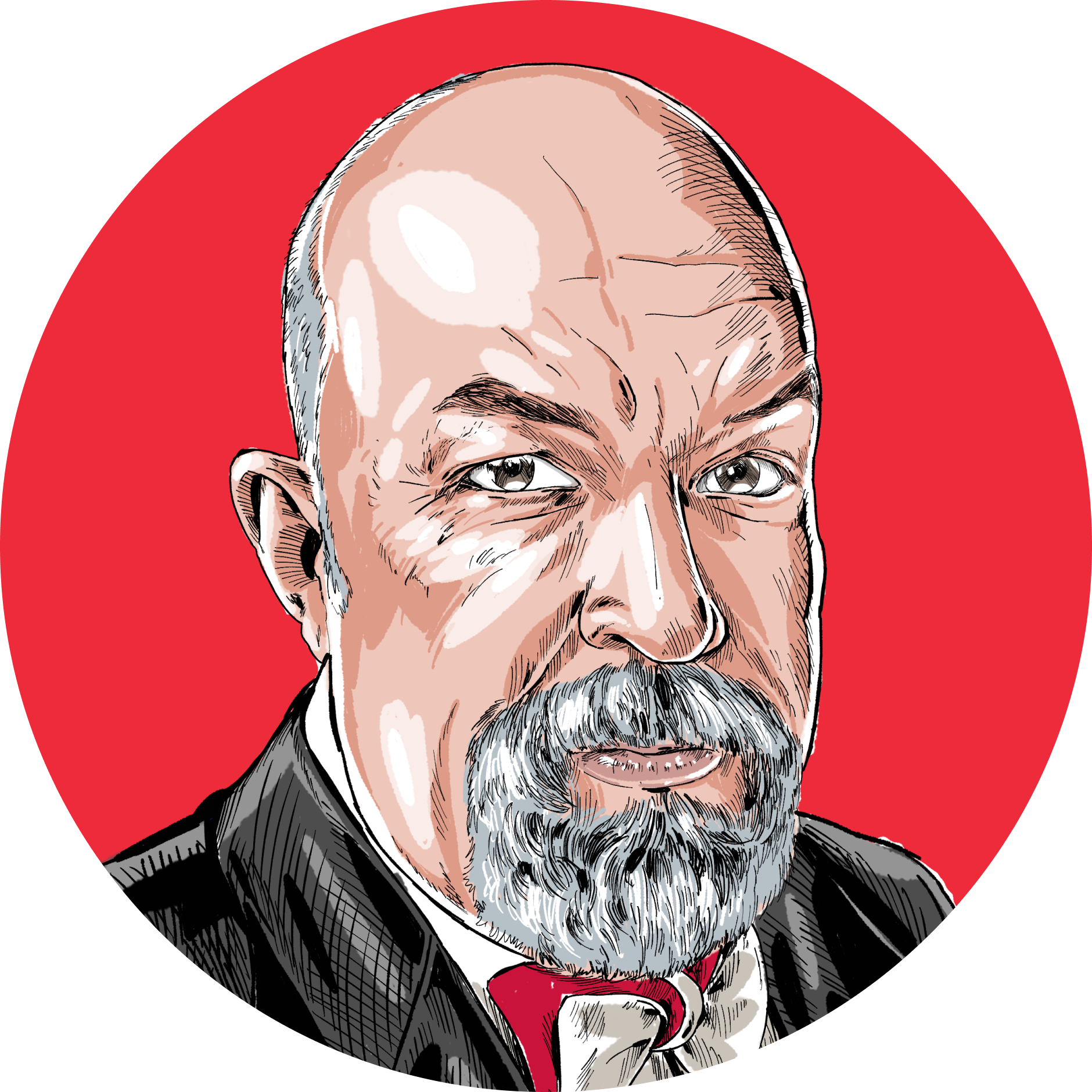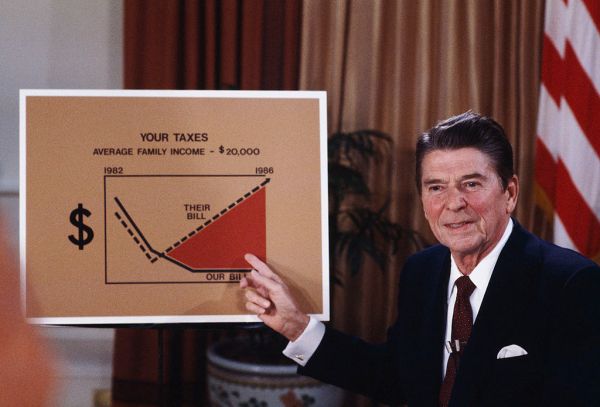Ron DeSantis is, by most accounts, not what you would call a “people person.”
DeSantis is prickly. He keeps his advisers at arm’s length, has a reputation for being cold and remote, doesn’t have many close friends, and trusts almost no one other than his wife.
Finally, a Reaganite!
Ronald Reagan was famously walled-off, not only from friends and colleagues but even from much of his family, including his children, with his wife, Nancy, being his only real intimate—all of which will sound very familiar to DeSantis watchers.
Like Reagan, DeSantis is a successful governor of a warm, sunny, Republican state. (It is hard to believe that Southern California once was the heartland of postwar Republican conservatism.) In fact, Florida today is very much what California was in its heyday: It is the summery, sun-drenched, affordable place you go to start over when you’ve had enough of Cleveland or Philadelphia or Chicago or wherever, the land of new beginnings for people who can’t handle Texas.
Because the legend—and the cartoon—of Reagan has displaced the historical figure in the popular consciousness, it is easy to forget that Reagan was in many ways not the most obvious standard-bearer of the midcentury conservatism created by William F. Buckley Jr., Barry Goldwater, and others of that kidney. Reagan was a Hollywood guy who honed his anti-Communist chops in two stints as president of the Screen Actors’ Guild (Reagan was the only union president to win the White House); he idolized Franklin Roosevelt and frequently described himself as a New Deal Democrat estranged from his party by the radicalism of the 1960s; he was a conservative governor, but he also signed the nation’s first no-fault divorce law and one of its first laws liberalizing abortion. Because of his commitment to defeat the Union of Soviet Socialist Republics rather than merely to contain it, we think of Reagan as the ultimate hawk, whereas his actual career as a peacenik (sometimes a pretty radical one) is almost forgotten: How many Americans today remember that Reagan planned to develop an anti-missile system and then share the technology with the Soviets in order to render nuclear ICBMs on both sides effectively useless?
Reagan, from a certain point of view, wasn’t much of a Reaganite, and was much more of a libertarian. (Take Reagan at his word: “I believe the very heart and soul of conservatism is libertarianism. I think conservatism is really a misnomer just as liberalism is a misnomer for the liberals.”) Whatever the Gipper’s secret sauce was, it wasn’t that “foolish consistency” which is “the hobgoblin of little minds.”
But Reagan also had some tools in his tool box that Ron DeSantis does not. For one thing, he was a movie star, and he could turn on his cinematic powers like flipping a light-switch. For another, the absence of the common touch that did not come naturally to him was partly compensated for by his years of service to General Electric, where he spent night after night giving speeches about free-market economics, the dangers of overambitious government, and the dual threats, one foreign and one domestic, to American liberty. Reagan was not a narrow ideologue in that there was more to his thinking than memorized Hayek passages or National Review pages. What he believed, he knew he believed, knew why he believed it, and could explain why he believed it.
Reagan’s gradual abandonment of his earlier libertarian views on abortion gave the impression that it was difficult, marked by regret, and something other than opportunistic. (The same cannot be said, I am afraid, of Mitt Romney, who at least moved in the right direction when it was politically convenient, or of the generation of Democrats who moved in the opposite direction out of pure cravenness.) DeSantis has gone from being a kind of Paul Ryan guy to the one Trump guy most detested by Trump guys, but his newfound populism feels more opportunistic than born-again. Like Ted Cruz, DeSantis seeks opportunities to demonstrate his combativeness, but he more often comes off prim, bitter, or smarmy. If Ronald Reagan could deploy the political equivalent of Julia Roberts’ megawatt smile, then Ron DeSantis has something more like Rob Schneider’s constipated smirk.
Reagan was a real celebrity, even if a faded one, but the kind of celebrity he had is, in many ways, even more politically potent in our time than it was in his. When the definitive account of Trumpism is written, historians will conclude that there were two factors that made Donald Trump president rather than another forgotten fringe candidate. The first was the failure of the Republican Party to take immigration seriously, particularly illegal immigration but not illegal immigration alone. The second was the fact that Trump was a genuine celebrity—not “Fox News famous,” not an “Oh, he’s still alive?” Scott Baio kind of figure, but a celebrity of the first rank. DeSantis is famous, but he is not a celebrity—the two are not the same thing.
You don’t have to be a celebrity to be elected president, but it helps. You don’t have to be a great one-on-one politician: Reagan could handle voters by the dozen or by the million, which is a pretty good range even if he wasn’t a great single-serving glad-hander, and that worked fine for him. Barack Obama had his limits (rooted in impatience and in his staggering self-importance) with individuals and small non-elite groups. DeSantis can also expect to be dinged quite a bit on the considerable political chasm that yawns between his earlier career and the sort of thing he says and does now. The ongoing Disney matter may play well in the bingo halls, but it brings out his pettiness and his vindictiveness, and it suggests a moral character to which the temptation of tyranny is by no means alien.
A successful president gets one big thing done (e.g.: Barack Obama got his health care law). A very successful president gets two big things done: Reagan won the Cold War and turned the cultural tide against the Great Society-style welfare statism that had been regnant from the mid-1960s. He campaigned on those things, and there was nobody that followed politics who did not understand those were his priorities.
DeSantis seems to want to be president, and, even though he has some real political handicaps, it is not impossible to imagine him achieving that. But what is it he wants to do? I do not think that wokeness, whatever that means this week, is quite the Iron Curtain—or even the malignant detritus of LBJ-ism.
Ron DeSantis is asking for the world’s biggest hammer, and it is by no means clear what he intends to build—or smash—with it.
Furthermore …
There are two kinds of columnists in these United States: columnists who can write about “Mugwumpean fastidiousness” and columnists who are not George Will.
L’Esprit d’Escalier
On Friday, I was on the Ricochet podcast with some old friends (Rob Long, James Lileks, and Peter Robinson) when the conversation turned, as it sometimes does, to the subject of drag queens, “drag-queen story hour,” etc. I didn’t quite say what I wanted to say (I’m a writer, not a talker), so, I’m going to give it another shot here.
Let me start with a story that is even more uncomfortable for me to write than it will be for the gentlemen in my audience to read, because I will omit a few details. A few years ago, I wrote a piece (one of my better ones, I think) on the pornography industry and adjacent sex-related businesses, with the annual Adult Video News awards—aka, the “porn Oscars”—as my centerpiece. There’s a lot of troubling stuff in that report, but some of it is worse than I communicated. For example, I omitted—as too unbelievable-sounding—my conversation with two women who were in a technical sense what we would call “sex workers” but who did not (according to their account) perform sex acts as such but rather serviced an extensive menu of paraphilias, both in specially commissioned videos and in person. One of the more lucrative services they offered involved performing what amounts to amateur surgery (with no real anesthesia) on a sensitive bit of male anatomy, working in hotel rooms. Their account sounded too extraordinary to be true, but, according to the women in question, this aspect of their business was driven by a very small number of dedicated repeat customers.
The paraphilia in question seems to me obviously disordered and unhealthy, dangerous, ghastly, and degrading. But if I were making a list of Greatest American Social Problems, that would probably be down around 1,129,844 in the rankings—it is bananas, but it is exceedingly rare. Rarity should matter, but we have a tendency to fixate on threats, possibilities, and social situations that are exotic and extreme, on remote possibilities that command the imagination, however unlikely they may be. I sometimes describe this as the Moose Principle: We worry a great deal about shark attacks, but sharks are way, way down on the list of animals that are likely to kill you, well behind wasps and bees, well behind the mass-murdering global menace that is the mosquito, and, in the realm of megafauna, behind cows and horses, domestic dogs, and that great noble giant of North America, the moose, an enormous, territorial, and sometimes aggressive creature that will stomp you into goo if provoked. But there isn’t any “Moose Week” on Discovery. Jaws gets great ratings, and Bullwinkle J. Moose does not.
(The “J” stands for “Jay,” a middle name he shares with Rocket “Rocky” J. Squirrel, in honor of legendary cartoon producer Jay Ward.)
I am not convinced that drag queens are anything like public enemy No. 1. (A much better case could be made for transgender ideology and its application to children, which is a different but not entirely unrelated issue.) I do not think the recent project of mainstreaming drag performances is good for society (for all sorts of reasons, not all of them related to social conservatism), but if you are looking for something that is emblematic of the decline of American family life, RuPaul’s Drag Race is the sexual-mores version of the bubbles that were still coming up to the surface a day or two after the sinking of the Titanic. The Supreme Court’s Obergefell decision was a mess and a mistake for all sorts of reasons, but same-sex marriage was hardly a half a blip on the radar track of marriage’s midwinter crash into the sociopolitical Himalayas of this overegged metaphor.
In fact, the “traditional marriage” and traditional sexual mores that conservatives profess to be in favor of have very, very few real-world partisans and haven’t had any for a long, long time. There has been no serious Republican effort to repeal no-fault divorce laws, to take what is probably the most important example. Nobody in our political life is doing much to bring back adultery as a tort or a crime; any serious press against premarital sex that exists in our time is a matter of marginal religious practice; the number of children born out of wedlock continues to climb across social groups, including among socially conservative groups; advertisements for pornographic book stores and “adult” (grievous misuse of a word) products are ubiquitous in notionally conservative states such as Texas and Oklahoma; prostitution is a common and increasingly open trade; etc. I do not think that each and every one of those is something that should be dealt with via statute (I think prostitution probably should be legal for the same reason I think recreational drugs should be), but if you got all the way from the first no-fault divorce law (Thanks, Gov. Reagan!) to the Great Bud Light Tribulation before you peeped the fact that something is awry, then maybe I have some doubts about the maturity of your social conservatism. Because it seems clear to me that the actual problem in this American life isn’t really the novel and exotic stuff—it is ordinary negligence, indifference, and the thousand natural shocks that flesh is heir to.
People like Lauren Boebert want you to believe that the country is in the grips of a shadowy cabal of pedophiles, but what the country is in the grip of is 36-year-old grandmothers in the middle of three generations of children born out of wedlock looking for somebody—somebody else—to blame for the sexual anarchy and family dysfunction that characterizes our society.
We invent dramatic sociopolitical supervillains in part because the real-world facts of the case are entirely banal, intensely terrifying, and, above all, unavoidably self-incriminating.
Economics for English Majors
Here is something you do not see every day: A regulator admitting error.
From the Wall Street Journal:
The Federal Reserve’s banking supervisors failed to take forceful action to address growing problems at Silicon Valley Bank before it collapsed last month, the central bank’s top regulator said, signaling a broad push to toughen rules on the industry.
Michael Barr, the Fed’s vice chair for supervision, said supervisors didn’t fully appreciate the extent of the vulnerabilities as SVB grew in size and complexity. When supervisors did find risks, they didn’t take sufficient steps to ensure the firm fixed those problems quickly enough, he said in a report Friday.
Regulators took control of Santa Clara, Calif.-based SVB on March 10. The collapse sparked a panic that led to the failure of New York-based Signature Bank and an intervention by financial regulators to protect uninsured depositors at both banks. The Fed supervised SVB and the Federal Deposit Insurance Corp. supervised Signature.
The chaos has since quieted, but some banks still face concerns. San Francisco-based First Republic Bank faces significant challenges, and there are no easy options for stemming the crisis at the bank.
An interesting aspect of the SVB story is that the bank was, in a meaningful sense, a victim of its own success. It grew so quickly that it had trouble figuring out what to do with all the deposits on hand, and, because a lot of those deposits were from tech startups and wealthy entrepreneurs, SVB had an unusually large share of uninsured deposits.
From the laughably misnamed Government Accountability Office:
Risky business strategies along with weak liquidity and risk management contributed to the recent failures of Silicon Valley Bank and Signature Bank. In both banks, rapid growth was an indicator of risk. In 2019–2021, the total assets of Silicon Valley Bank and Signature Bank grew by 198 percent and 134 percent respectively—far exceeding growth for a group of 19 peer banks (33 percent growth in median total assets). To support their rapid growth, the two banks relied on uninsured deposits, which can be an unstable source of funding because customers with uninsured deposits may be more likely to withdraw their funds during times of stress. Additionally, Silicon Valley Bank was affected by rising interest rates and Signature Bank had exposure to the digital assets industry. The banks failed to adequately manage the risks from their deposits.
Something that I feel like I should keep repeating until people start repeating it back to me: We talk about whether we have “too much regulation” or “too little regulation,” but the real questions are: What kind of regulation? Implemented by whom? What does day-to-day oversight look like? Are we going to be mainly prospective, trying to head off trouble, or retrospective, punishing wrongdoing after the fact?
These are not simple questions, and you should not trust the people who tell you otherwise.
Words About Words
Whence lukewarm?
There is folk etymology holding that the adjective has something to do with Luke the Evangelist, but this is not so. Luke was anything but lukewarm in his devotion, and the famous bit about “neither hot nor cold” is in Revelation.
There are some popular false etymologies of the name Luke, too, usually connecting it to lux, Latin for light. The name is derived from the Italian region of Lucania, name of which may have some connection with an ancient, pre-Latin word for light, but scholars regard that claim as only conjecture.
A popular website discussing baby names informs us: “The most famous Luke, of course, is Luke Skywalker.” Well. Why bother writing a gospel at all?
Lukewarm, meaning tepid and, by analogy, desultory or unenthusiastic, is of unclear origin, though luke or leuk by itself meaning tepid survived into the English of the 16th century at least. The dictionaries suggest that there may have been an Old English version of the word (hleoc) that has escaped recording.
If you Google hleoc, you will get advertisements for home-equity lines of credit. Machine language learning is based on real-world input, including all of our real-world typos and all our insane Google searches. (“Baby powder made of babies?”) In that as in much else, artificial intelligence is no match for organic stupidity.
Elsewhere
Slow GDP growth, persistent inflation, big trouble:
There was some hope that the Biden team, if not Biden himself, would achieve a level of basic competence—the steady hand on the tiller that so often seemed absent under Trump.
But this new normal is not the normal Americans wanted to return to. Inflation is still running at about twice what it has for the past couple of decades, and GDP growth is currently at half what it averaged in the George W. Bush years.
Me yammering on the Ricochet podcast.
You can buy my most recent book, Big White Ghetto, here.
You can buy my other books here.
You can see my New York Post columns here.
In Closing
I’d put the estimated life expectancy of that airborne blueberry at 0.003 seconds.










Please note that we at The Dispatch hold ourselves, our work, and our commenters to a higher standard than other places on the internet. We welcome comments that foster genuine debate or discussion—including comments critical of us or our work—but responses that include ad hominem attacks on fellow Dispatch members or are intended to stoke fear and anger may be moderated.
You are currently using a limited time guest pass and do not have access to commenting. Consider subscribing to join the conversation.
With your membership, you only have the ability to comment on The Morning Dispatch articles. Consider upgrading to join the conversation everywhere.